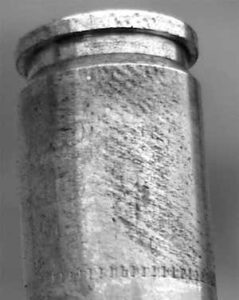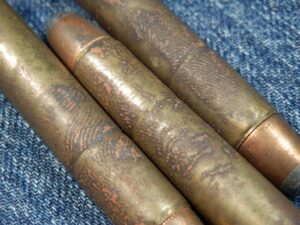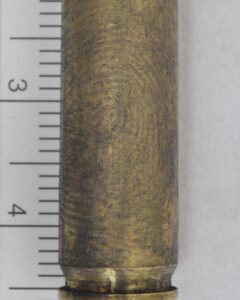Fingerprints on bullets can be an important piece of evidence in a criminal investigation. However, handling bullets can leave behind smudges and smears that can obscure or even completely eliminate these vital clues.
Whether you’re a law enforcement officer, a firearms enthusiast, or simply want to know how to properly handle bullets, this guide will provide you with the knowledge and techniques you need.
How to clean fingerprints off bullets
- Gather your materials: To clean fingerprints off bullets, you’ll need a pair of latex gloves, a soft cloth, and a can of compressed air. The gloves will help protect your own fingerprints from smudging the bullet, and the compressed air will help remove any loose debris or dirt.
- Put on your gloves: Before handling the bullet, it’s important to protect your own fingerprints. Put on a pair of latex gloves to ensure that you don’t leave any smudges or smears on the bullet.
- Wipe the bullet with a soft cloth: Use a soft cloth to gently wipe away any dirt or debris from the bullet. Be careful not to apply too much pressure, as this can distort or obliterate any existing fingerprints.
- Use compressed air to remove any remaining dirt: Once you’ve wiped the bullet with a cloth, use a can of compressed air to blow away any remaining dirt or debris. Be sure to hold the can at least six inches away from the bullet to avoid blowing away any fingerprints.
- Repeat as needed: If the bullet is still dirty or if you can’t remove all of the fingerprints, repeat these steps until the bullet is clean and the fingerprints are clearly visible.
By following these steps, you can effectively clean fingerprints off bullets and preserve them for forensic analysis. Whether you’re a law enforcement officer, a firearms enthusiast, or simply want to know how to properly handle bullets, these tips will help you do it safely and effectively.
How long do fingerprints last on bullets?
Fingerprints on bullets can last for a long time, depending on a variety of factors. Some of the main factors that can affect the longevity of fingerprints on bullets include:
- Environmental conditions: Humidity, temperature, and other environmental factors can all impact the stability of fingerprints on bullets. In general, fingerprints tend to last longer in dry, cool conditions.
- Handling of the bullet: Handling the bullet can smudge or distort the fingerprints, making them more difficult to identify. It’s important to handle bullets as little as possible, and to use gloves when handling them to preserve the fingerprints.
- Age of the bullet: The age of the bullet can also impact the stability of the fingerprints. Over time, the natural oils in the skin can evaporate, causing the fingerprints to fade.
In general, it’s difficult to predict exactly how long fingerprints will last on bullets, as there are so many variables at play. However, with proper handling and storage, it’s possible for fingerprints on bullets to last for several months or even longer.
Does rubbing alcohol remove fingerprints?
Rubbing alcohol (also known as isopropyl alcohol) can be used to remove fingerprints from some surfaces. However, its effectiveness can vary depending on the surface and the age of the fingerprints.
When it comes to removing fingerprints from smooth, non-porous surfaces like glass or metal, rubbing alcohol can be an effective option. Simply apply a small amount of alcohol to a clean cloth or cotton swab and gently rub it over the fingerprint. The alcohol can dissolve the oils in the fingerprint, making it easier to wipe away.
On porous surfaces like paper or wood, however, rubbing alcohol may not be as effective at removing fingerprints. The pores in these materials can trap the oils in the fingerprint, making it more difficult to remove. In these cases, other methods like dusting with fingerprint powder and lifting with clear tape may be more effective.
It’s also worth noting that the longer a fingerprint has been on a surface, the more difficult it may be to remove. Fresh fingerprints will typically be easier to remove than fingerprints that have been on a surface for an extended period of time.
Overall, rubbing alcohol can be a useful tool for removing fingerprints from some surfaces, but it may not work for all surfaces or all types of fingerprints.
What can you clean bullets with?
There are a few different methods you can use to clean bullets, depending on the type of dirt or debris you’re trying to remove and the condition of the bullets. Here are a few options you can consider:
- Wiping with a cloth: For general cleaning or removing light dirt or debris, you can use a soft cloth to gently wipe the bullets. Use a circular motion and be careful not to apply too much pressure, as this can distort the bullets or damage the grooves on the surface.
- Using compressed air: A can of compressed air can be useful for removing loose dirt or debris from the surface of the bullets. Hold the can at least six inches away from the bullet and use short bursts of air to blow away any dirt.
- Soaking in a cleaning solution: If the bullets are particularly dirty or you need to remove tougher grime or corrosion, you may need to soak them in a cleaning solution. There are several commercial cleaning solutions available specifically designed for cleaning bullets, or you can make your own by mixing hot water with a mild detergent or solvent like denatured alcohol. Soak the bullets in the solution for a few hours or overnight, then use a soft brush to gently scrub away any dirt or grime. Rinse the bullets thoroughly with water after cleaning and dry them completely before using or storing them.
- Using ultrasonic cleaning: Another option for cleaning bullets is to use an ultrasonic cleaner. These devices use high-frequency sound waves to create tiny bubbles in a cleaning solution, which can help to loosen and remove dirt and debris from the surface of the bullets. Simply place the bullets in the cleaning solution and let the machine do the work.
No matter which method you choose, it’s important to handle the bullets carefully and avoid applying too much pressure or using abrasive materials, as these can damage the bullets.
What happens if you soak a bullet in water?
Soaking a bullet in water can have a variety of effects, depending on the type of bullet and the length of time it is soaked. Here are a few potential outcomes:
- Rust: If the bullet is made of ferrous metal (like iron or steel), it is likely to rust if it is soaked in water for an extended period of time. The rust can weaken the metal and potentially affect the bullet’s performance.
- Swelling of wooden bullets: If the bullet has a wooden component (such as a wooden bullet or wooden bullet casing), it may swell or become misshapen when soaked in water. This can affect the bullet’s accuracy and performance.
- Changes in weight: Depending on the type of bullet and the length of time it is soaked, it may absorb water and change in weight. This can affect the bullet’s velocity and impact when it is fired.
- Changes in performance: In general, it’s not a good idea to soak bullets in water, as it can alter their performance and potentially make them unsafe to use. It’s always best to follow the manufacturer’s recommendations for cleaning and storing bullets to ensure that they are in good condition and ready to use.
In summary, soaking bullets in water can lead to rust, swelling, changes in weight, and changes in performance. It’s generally not recommended to soak bullets in water, as it can potentially affect their performance and make them unsafe to use.
Do bullets work after getting wet?
Whether or not bullets will work after getting wet depends on several factors, including the type of bullet, the length of time they were wet, and the conditions they were stored in while wet. Here are a few things to consider:
- Type of bullet: Some types of bullets are more resistant to moisture than others. For example, certain types of jacketed bullets have a layer of copper or other metal that helps to protect the bullet from moisture. Other types of bullets, such as lead bullets, may be more prone to corrosion or other damage when exposed to moisture.
- Length of time wet: The longer a bullet is wet, the more likely it is to be damaged or compromised. If a bullet becomes wet and is allowed to dry out quickly, it may still be usable. However, if it remains wet for an extended period of time, it may corrode or become misshapen, which can affect its performance.
- Storage conditions: The way the bullet is stored while it is wet can also impact its performance. If it is stored in a humid or damp environment, it is more likely to corrode or become damaged. It’s important to store bullets in a dry, cool place to help preserve their quality and performance.
In general, it’s best to avoid getting bullets wet if possible, as moisture can damage the bullet and affect its performance. If a bullet does become wet, it’s important to dry it off as soon as possible and store it in a dry place to help preserve its quality. Even if the bullet appears to be undamaged after being wet, it’s still a good idea to err on the side of caution and not use it to ensure your safety and the safety of others.
Other cleaning guides



